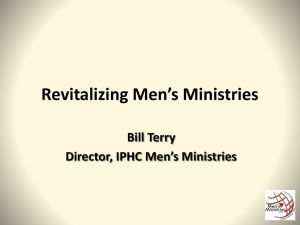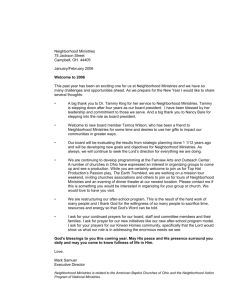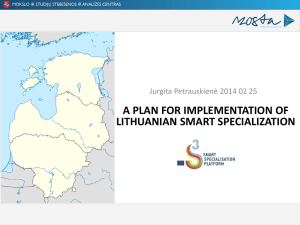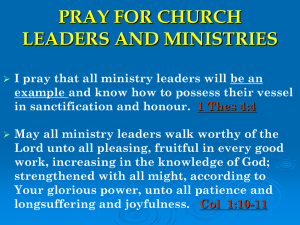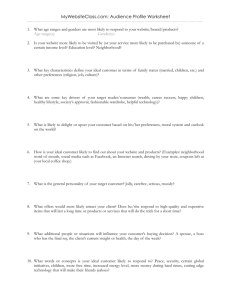Syllabus
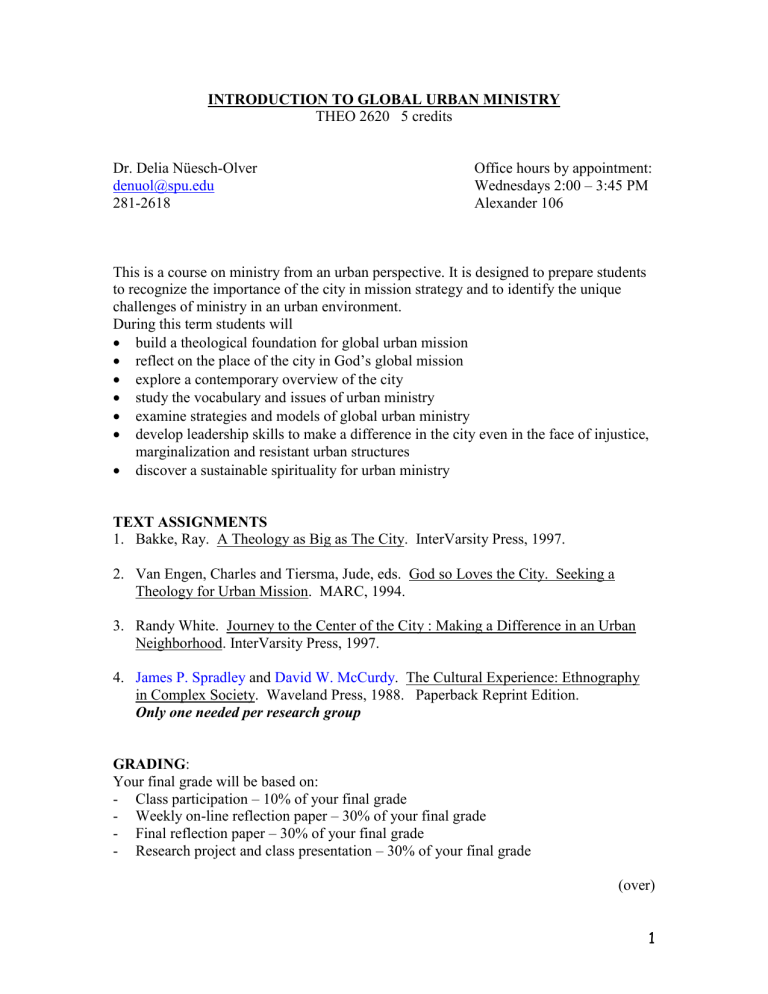
INTRODUCTION TO GLOBAL URBAN MINISTRY
THEO 2620 5 credits
Dr. Delia Nüesch-Olver denuol@spu.edu
281-2618
Office hours by appointment:
Wednesdays 2:00 – 3:45 PM
Alexander 106
This is a course on ministry from an urban perspective. It is designed to prepare students to recognize the importance of the city in mission strategy and to identify the unique challenges of ministry in an urban environment.
During this term students will
build a theological foundation for global urban mission
reflect on the place of the city in God’s global mission
explore a contemporary overview of the city
study the vocabulary and issues of urban ministry
examine strategies and models of global urban ministry
develop leadership skills to make a difference in the city even in the face of injustice, marginalization and resistant urban structures
discover a sustainable spirituality for urban ministry
TEXT ASSIGNMENTS
1.
Bakke, Ray. A Theology as Big as The City. InterVarsity Press, 1997.
2.
Van Engen, Charles and Tiersma, Jude, eds. God so Loves the City. Seeking a
Theology for Urban Mission. MARC, 1994.
3.
Randy White. Journey to the Center of the City : Making a Difference in an Urban
Neighborhood. InterVarsity Press, 1997.
4.
James P. Spradley and David W. McCurdy . The Cultural Experience: Ethnography in Complex Society. Waveland Press, 1988. Paperback Reprint Edition.
Only one needed per research group
GRADING :
Your final grade will be based on:
Class participation – 10% of your final grade
Weekly on-line reflection paper – 30% of your final grade
Final reflection paper – 30% of your final grade
Research project and class presentation – 30% of your final grade
(over)
1
You are allowed three absences from class sessions. Each absence beyond these limits will result in a reduction of five points from your total score.
A = 100-95 A- = 94-90 B+ = 89-87 B = 86-83
B- = 82-80 C+ = 79-77 C = 76-74 C- = 73-70
D = 69-65 E = 64 and below
OFFICE HOURS:
As indicated above, my office hours are by appointment on Wednesdays 2:00 – 3:45 PM
To make an appointment please go to SPU Web Page, click on People click on Faculty Personal Home Pages click on my name click on Autumn 2001 Student Office Hour Sign-up Form
The password is “Iluvclass” (without quotation marks). Please note the capital “I” and the
“u”.
COURSE PROCEDURES AND REQUIREMENTS:
1.
Class attendance and participation a.
Regular class attendance is expected. You are allowed three absences from class sessions. Each absence beyond these limits will result in a reduction of five points from your total score. b.
Please remember that it is unfair to all of us when we lose several minutes at the beginning of each class as people drift in. Plan to arrive on time for each class. c.
This course requires that you not only be physically present, but also that you actively participate in class discussion, as well as question and answer periods after a guest speaks in class. d.
Because of personality type or cultural background, some students may find it difficult to participate in class .
If you think this requirement might be unfair to you, you need to talk to me at the beginning of the term. e.
You are an important part of this class, and so is everybody else. Please respect all persons in the class. This includes listening when others are speaking and not monopolizing class discussions. f.
You may bring food into the room, but you must clean up after yourself.
ASSIGNMENTS:
1.
Weekly On-line Reflection - 30% of your final grade
You need to enroll yourself in our on-line classroom, Introduction To Global Urban
Ministry, following the simple instructions at www.blackboard.com
. The access code is
“Iluvclass”
(over)
2
You must read the sections of the textbooks assigned to that week.
Each Wednesday by 1:00 PM you will submit a reflection paper through www.Blackboard.com
Your reflection will be one to two pages in length (no more than two), doublespaced.
In your reflection you will a.
Outline key points of the reading assigned to that week and your reaction to them. What are the main ideas raised in the readings? Do you agree or disagree with these ideas, and why do you agree or disagree? What might be a counter-argument to the perspective offered? How would you further develop the ideas? b.
Discuss what challenges you c.
Include specific questions and comments you might like to raise in class discussion d.
You may want to reflect on how the week’s selection relates to other things you are reading and studying.
Your Weekly On-line Reflection should be, in essence, an outline for your participation in the in-class discussion of the readings and the weekly subject matter.
Please do not summarize the readings. I am interested in hearing your voice – your ideas, your observations, and your perspectives on the views and positions presented in the readings.
The point of the assignment is to read critically and engage with the views and ideas offered by the writer. Please do not dismiss a reading because you dislike the ideas and viewpoints offered. Conversely, do not simply accept a reading and its ideas because you like or respond positively to its viewpoint. Reading critically and engaging with the reading means, in this context, exploring, investigating, testing, and challenging your responses to the reading as well as the viewpoints and ideas posited by the writer.
2.
A five or six page, double-spaced, final paper (30% of your final grade) . This is intended to be an integration paper where you will reflect on what you learned about God, about yourself, and about global urban ministries through this course.
Ideally, your reflection will integrate what you have read, what you have heard in class, as well as what you experienced through your research project for this term.
(over)
3
3.
Research project and class presentation ( 30% of your final grade): This is a group project.
A.
How the group will function:
1.
Each group will have no less than four and no more than five students.
2.
Your group will select a facilitator. The group facilitator will inform me of the configuration of the group. I will communicate with the group via the facilitator.
3.
Your group should anticipate meeting together out of class for as long as it takes to do your on-site research and to prepare an excellent group presentation. The group facilitator is responsible for arranging the place of your meetings, but not for doing all the research or for organizing the presentation.
4.
A single grade will be given for the class presentation to all the members of the group. You will be graded as a whole for the group effort. You will be evaluated on evidence of careful research, planning and preparation, as well as professionalism in your presentation.
5.
Towards the end of the term, on the day when you evaluate me, you will also evaluate the other members of your group. This will be reflected in their final grade. If during the term you have problems in your group, please talk with me. I will only intervene in the running of a group at the request of a member.
B.
Doing the project
1.
Before you begin the on-site research you will need to read Spradley and
McCurdy’s The Cultural Experience. Ethnography in Complex
Society.
2.
The topic of your project must be pre-approved by the professor. Before you make a group appointment to talk with the professor about your project you will need to a.
form your group b.
discuss together Spradley’s book c.
start to narrow a possible topic that will be very useful to you in your ministry – current or future.
3.
In dialogue with the professor your group will choose to study a neighborhood in Seattle. You will visit the neighborhood, spend time there, and do participant observation as discussed by Spradley and
McCurdy.
4.
Your assignment is to understand what makes this urban neighborhood unique and what gives it its identity .
5.
Each of the members of the group will need to talk with at least two residents. Get their definitions of the terms “neighborhood” and
“community.” Find out what they think are the identifying characteristics of that neighborhood. Find out some of the strengths of the neighborhood from their perspective. Try to identify some problems that need to be addressed. (over)
4
6.
In consultation with the professor, you will choose two Christian ministries in the same neighborhood. One of these ministries must be a church: an established congregation, a new church planting, or a house church. The church you visit could be in English or in a foreign language. If it is in a foreign language, you need to make arrangements for a translator or a cultural broker who would help you understand what is happening.
7.
Go as a group to both ministries, take a tour, and conduct an interview using questions that will be formulated together in class. Find out what are the unique challenges of ministry in that urban environment.
8.
Once you complete your on-site research and as you start to process all the information you have collected, ask yourselves questions such as, a.
How can we integrate what we have read and learned in class, as well as what we have learned through our research on the field? b.
How can we relate what we learned and experienced to the goals and objectives of this class as expressed in the first page of this syllabus. For instance,
- how does what I have learned for this project relate to
global urban ministries?
- what are the connections in this neighborhood to other
parts of the world?
- how could reaching people in this neighborhood fit with a
global urban mission?
- how does what is happening in other parts of the world
affect what is happening in this neighborhood?
C.
Class presentation
1.
Towards the end of this term you will present your findings in class
.
2.
Your class presentation will last 15 - 20 minutes.
3.
This will be a group report reflecting the best of your group thinking. I am not interested in several people parading in front of the class each doing a short presentation.
4.
Every person should be involved in this report in a meaningful way. You are encouraged to use maps, charts, pictures, overheads, and multimedia in general. You may want to choose a member of the group to do the entire presentation, while others work on the AV, effects, handouts, etc.
5.
The group will need to be prepared to answer questions from the class.
6.
Your class presentation needs to be highly professional, very interesting, and engaging.
7.
In preparation for your presentation ask yourselves questions such as, a.
How can we help our fellow students understand the neighborhood we studied, the people we met, and the experience we had? b.
How can we share what we now know in a most interesting yet solidly academic presentation?
(over)
5
c.
What did each of us learn through this experience about God and about global urban ministries that we would not have learned otherwise?
Please note:
Late Work Is Not Accepted
WEEK 1
In preparation for this week you will read:
Bakke, Introduction through Chapter 9
Introductions
Global Urban Ministries Overview
Urban Ministries: The Biblical Mandate
WEEK 2
In preparation for this week you will read:
Van Engen and Tiersma, Part I
Biblical models of global urban ministry
Global characteristics of cities
WEEK 3
In preparation for this week you will read:
Van Engen and Tiersma, Part II
A theological response to global characteristics of cities
Vocabulary of urban issues: megalopolis, exurbia, suburbia, ghetto, etc.
Typology of urban churches
ISSUES OF URBAN MINISTRY
WEEK 4
In preparation for this week you will read:
Bakke, Chapters 10 through 17
The City and the Inner City
Urban Stratification and the Urban Church
WEEK 5
In preparation for this week you will read:
Van Engen and Tiersma, Part III
Poverty from an Institutional Perspective
Youth (over)
6
WEEK 6
In preparation for this week you will read:
Bakke, Chapters 18 through 26
Minorities
Socialization
WEEK 7
In preparation for this week you will read:
Van Engen and Tiersma, Part IV
The Urban Church and The Urban Minister
Spirituality and Powers – Contrasting views
WEEK 8
In preparation for this week you will read:
White, pages 17 - 124
Discovering A Sustainable Spirituality For Urban Ministry
Developing skills to make a difference in the city even in the face of injustice, marginalization and resistant urban structures
WEEK 9
Class presentations
WEEK 10
Class presentations
WEEK 11
-
The City in God’s Global Mission
Evaluations
7

